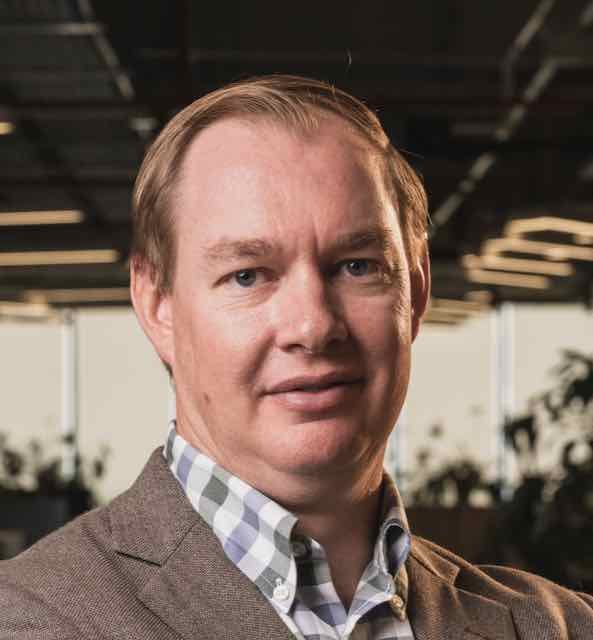After more than a decade in business, an Ashland-based software maintenance company merged with a newer California technology consultancy.
Corgibytes, founded in 2008 by Scott Ford and Andrea Goulet, is now part of year-old C Infinity.
Ford and Goulet started Corgibytes to modernize and maintain software for companies ranging from startups to large enterprises.
Merger discussions came about earlier this year, after Corgibytes had been hired by C Infinity as a subcontractor for a project assisting a company in migrating from one software platform to another. As they became acquainted they got to talking and decided to join forces, Ford said.
The merger officially closed Aug. 1. Financial terms were not disclosed.
The Corgibytes staff of eight have migrated over to the C Infinity team, with Ford working as a strategic technology adviser, focusing on product development. Goulet stepped down from the company in June, before the merger, to pursue other interests and now serves as an adviser to the firm.
Ford will remain based in Richmond, working remotely.
“The Corgibytes brand is going to stay alive but really focus on products. So it’s really the consulting practice that has been merged in with C Infinity,” Ford said.
C Infinity will license the Corgibytes’ code instruction intellectual property and offer Corgibytes code instructions to its customers. The relationship includes a revenue sharing agreement. Most of Corgibytes clients also have shifted over to C Infinity.
Throughout its 16 years in business, Corgibytes has become a “mender” in software development, which refers to those who focus on improving and remodeling a client’s existing software as opposed to “makers,” who create software.
Ford said Corgibytes coined the term “mender” and the company hosts an annual conference called MenderCon, which will continue to be held.
Among the tasks that Corgibytes conducts are code inspections, where it examines a client’s code and spots opportunities for upgrades.
Some of Corgibytes’ previous clients include Capital One and the National Institutes of Health. In 2023, the company brought in $1.3 million in revenue.
The merger occurred as C Infinity was nearing its one-year anniversary as a company. Given its youth and focus on internal growth, C Infinity CEO Chris Coughlan said a merger was not in the cards when he founded the company last year.
But with software redevelopment services in high demand in a competitive market, he said the addition of Corgibytes was the right move for the company.
“This was very opportunistic, and it just felt like the right thing for both firms at the right time,” he said. “Especially because we’ve definitely seen from our current clients that the focus on application modernization or legacy code is something that they are very focused on right now, and we wanted to be responsive to that need.”
Coughlan said C Infinity’s clients are mid-market, growth-stage companies or large enterprises in industries including media and entertainment, financial services, nonprofits, real estate, supply chain and logistics and manufacturing.
Coughlan said sometimes companies attempt to build new software on top of their original, legacy software, but it isn’t always compatible. Fewer and fewer engineers know how to understand and work with legacy codes, which is Corgibytes’ expertise.
He said Corgibytes engineers “bring clarity to the chaos of legacy systems.”
After more than a decade in business, an Ashland-based software maintenance company merged with a newer California technology consultancy.
Corgibytes, founded in 2008 by Scott Ford and Andrea Goulet, is now part of year-old C Infinity.
Ford and Goulet started Corgibytes to modernize and maintain software for companies ranging from startups to large enterprises.
Merger discussions came about earlier this year, after Corgibytes had been hired by C Infinity as a subcontractor for a project assisting a company in migrating from one software platform to another. As they became acquainted they got to talking and decided to join forces, Ford said.
The merger officially closed Aug. 1. Financial terms were not disclosed.
The Corgibytes staff of eight have migrated over to the C Infinity team, with Ford working as a strategic technology adviser, focusing on product development. Goulet stepped down from the company in June, before the merger, to pursue other interests and now serves as an adviser to the firm.
Ford will remain based in Richmond, working remotely.
“The Corgibytes brand is going to stay alive but really focus on products. So it’s really the consulting practice that has been merged in with C Infinity,” Ford said.
C Infinity will license the Corgibytes’ code instruction intellectual property and offer Corgibytes code instructions to its customers. The relationship includes a revenue sharing agreement. Most of Corgibytes clients also have shifted over to C Infinity.
Throughout its 16 years in business, Corgibytes has become a “mender” in software development, which refers to those who focus on improving and remodeling a client’s existing software as opposed to “makers,” who create software.
Ford said Corgibytes coined the term “mender” and the company hosts an annual conference called MenderCon, which will continue to be held.
Among the tasks that Corgibytes conducts are code inspections, where it examines a client’s code and spots opportunities for upgrades.
Some of Corgibytes’ previous clients include Capital One and the National Institutes of Health. In 2023, the company brought in $1.3 million in revenue.
The merger occurred as C Infinity was nearing its one-year anniversary as a company. Given its youth and focus on internal growth, C Infinity CEO Chris Coughlan said a merger was not in the cards when he founded the company last year.
But with software redevelopment services in high demand in a competitive market, he said the addition of Corgibytes was the right move for the company.
“This was very opportunistic, and it just felt like the right thing for both firms at the right time,” he said. “Especially because we’ve definitely seen from our current clients that the focus on application modernization or legacy code is something that they are very focused on right now, and we wanted to be responsive to that need.”
Coughlan said C Infinity’s clients are mid-market, growth-stage companies or large enterprises in industries including media and entertainment, financial services, nonprofits, real estate, supply chain and logistics and manufacturing.
Coughlan said sometimes companies attempt to build new software on top of their original, legacy software, but it isn’t always compatible. Fewer and fewer engineers know how to understand and work with legacy codes, which is Corgibytes’ expertise.
He said Corgibytes engineers “bring clarity to the chaos of legacy systems.”





Deeper dive – You talking about C++, JAVA, Pytthon, Oracle. SAP?